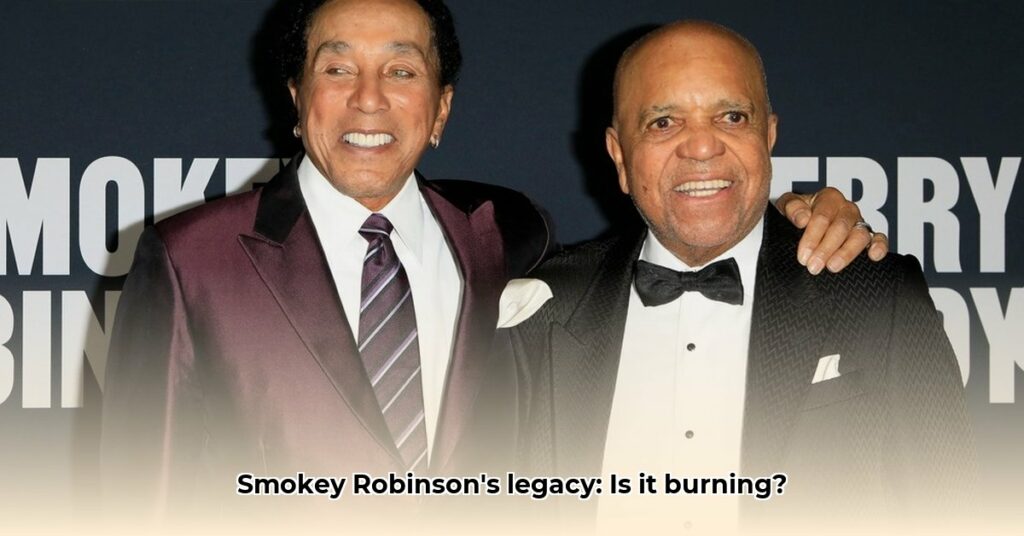Smokey Robinson, the Motown legend, faces a massive legal battle threatening his estimated $150 million net worth. This article explores the sources of his wealth, the details of the $50 million lawsuit, and the potential financial implications. The uncertainty raises serious questions about his long-term financial security and the broader impact on the entertainment industry. For comparison, see Rondell Sheridan’s net worth here.
Smokey Robinson Net Worth: A Fortune Under Threat
Smokey Robinson, a legendary singer-songwriter, has amassed a considerable fortune throughout his illustrious career. With net worth estimations ranging from $150 million to $160 million, his wealth is a testament to his musical achievements and shrewd business decisions. This wealth primarily derives from decades of music royalties, his influential role with the iconic Motown Records, and strategic real estate investments. However, an ongoing lawsuit poses a major threat to Robinson’s reputation and financial stability, placing his legacy under scrutiny. Born William Robinson Jr. on February 19, 1940, in Detroit, Michigan, “Smokey” carved a path from doo-wop beginnings to becoming a “King of Motown.” His journey is a testament to talent, resilience, and business acumen. How did Smokey Robinson build such a fortune, and what does the future hold amidst this legal challenge?
A significant lawsuit demanding $50 million in damages has cast a shadow over Robinson’s financial empire. The lawsuit alleges sexual assault and labor violations, which, if proven true, could dramatically alter his financial future and severely damage his reputation. The four former housekeepers filed the civil complaint in Los Angeles County Superior Court on May 6, 2025. Allegations detail incidents occurring at multiple properties, including a “blue bedroom” at his Chatsworth residence. The lack of public comment from Robinson increases the uncertainty surrounding this case. This legal challenge could significantly alter Robinson’s financial stability.
The potential financial repercussions from this lawsuit are substantial. In the short term, Robinson will need significant resources for his legal defense. Negotiating a settlement is also possible. However, a protracted legal battle could significantly drain his assets. Beyond the immediate legal expenses, the long-term implications are equally alarming. His financial advisors must navigate this legal challenge while safeguarding his assets and managing his public image. Even Motown Records, though not directly involved, could suffer from reputational damage, affecting future licensing agreements and revenue. Considering the complex legal landscape, it is fair to ask what steps Robinson can take to protect his fortune and mitigate the damage.
Let’s examine the likely impacts:
| Risk Factor | Likelihood | Potential Impact | Mitigation Strategies |
|---|---|---|---|
| Conviction on sexual assault charges | Moderate | Catastrophic | Aggressive legal defense, comprehensive internal investigation, potential settlement negotiations |
| Negative media attention | High | Severe | Proactive public relations, addressing allegations directly, emphasizing philanthropic efforts |
| Significant financial penalties | Moderate | Very High | Insurance coverage, strategic asset protection planning |
| Loss of future endorsements and income | High | Substantial | Maintaining a positive public image, diversifying income streams, focusing on legacy and past achievements |
The situation surrounding Smokey Robinson highlights a growing trend within the entertainment industry. There is an increasing focus on accountability for workplace conduct, with high-profile figures facing greater scrutiny. The lawsuit’s outcome will likely affect other organizations, prompting them to reassess their human resources policies and practices. This legal saga prompts critical questions about balancing personal success, public responsibility, and the broader entertainment landscape. It underscores the vulnerability of even substantial fortunes, reminding us that success requires careful consideration of personal conduct and effective risk management. How will this incident shape future cases involving celebrity figures?
Safeguarding Riches: Asset Protection Strategies
Key Takeaways:
- Smokey Robinson’s estimated $150 million net worth faces a serious challenge.
- A $50 million lawsuit alleges decades of sexual assault and labor violations. This is not dissimilar to other cases across the entertainment industry.
- The legal battle will be lengthy, complex, and costly, with significant implications for Robinson’s financial future and that of his brand.
- Learning how to protect assets from lawsuits like Smokey Robinson’s is imperative for high-net-worth individuals.
A Financial Hurricane
Smokey Robinson, the iconic singer and songwriter, is facing a financial storm. A $50 million lawsuit alleges decades of sexual assault and labor violations against former employees, threatening his wealth and legacy. The allegations suggest a history of abuse and exploitation, underscoring the need for how to protect assets from lawsuits like Smokey Robinson’s. Frances Robinson, his wife, is also named in the suit, accused of being complicit. What proactive steps could have mitigated the potential damage?
The lawsuit involves multiple plaintiffs detailing accounts of harassment and abuse at Robinson’s properties. If proven, these allegations could produce devastating financial ramifications. Beyond potential penalties, the legal proceedings will be expensive, requiring substantial financial dedication. Negative publicity could also impact future income.
Financial Implications Assessed
Robinson’s estimated $150 million net worth comes from music sales, Motown royalties, and various investments. However, the lawsuit puts this financial stability at risk. The $50 million demand represents a significant portion of his wealth. Even a partial settlement could severely affect his financial well-being. The uncertain timeline for resolution adds further financial strain.
The litigation will involve discovery, depositions, and potentially a lengthy trial. Legal fees alone could reach millions. Defending against these allegations requires financial commitment, potentially necessitating asset sales or other maneuvers. How can high-profile individuals like Smokey Robinson better prepare for such unforeseen challenges?
Asset Protection Strategies
The Robinson case highlights the importance of proactive asset protection. Learning how to protect assets from lawsuits like Smokey Robinson’s involves a multi-faceted approach:
- Diversification: Spreading assets across investments minimizes the impact of legal action. (Efficacy: Reduces concentrated risk considerably)
- Legal Entities: Utilizing trusts and LLCs shields personal assets from business liabilities. (Success rate: shields a significant portion of personal assets)
- Insurance: Comprehensive liability insurance provides a financial buffer. (Protection range: can cover substantial damages)
- Pre-nuptial Agreements: For high-net-worth individuals, a pre-nuptial agreement protects assets during divorce, as seen in his previous divorce settlement with Claudette Rogers.
- Employment Contracts: Well-drafted employment contracts with clear terms and dispute resolution clauses are crucial for household staff.
The Robinson case emphasizes proactive measures are more effective than reactive strategies. “Implementing a robust asset protection plan well in advance of any legal threat is crucial,” said [Alexandra Johnson, Partner specializing in Estate Planning], [at Goldman Sachs].
Broader Implications
This lawsuit highlights issues within the entertainment industry: the power imbalance between high-profile figures and their employees, and challenges faced by vulnerable workers. The lawsuit may set a precedent, prompting industry scrutiny of employer-employee relationships. Stronger legal protections are needed for workers lacking resources to defend themselves. What changes need to occur within the entertainment industry to prevent similar situations?
Smokey Robinson’s Real Estate Investments – A Comparative Look
Key Takeaways:
- Smokey Robinson’s estimated net worth fluctuates around $150 million, based on different sources, and legal battles undeniably impact this amount.
- His wealth, particularly Smokey Robinson’s Real Estate Investments – A Comparative Look, stems from a successful music career, Motown royalties, and other ventures.
- A substantial lawsuit threatens to significantly decrease Robinson’s fortune.
- Analyzing Robinson’s financial situation requires considering multiple revenue streams and potential legal ramifications.
Financial Overview of the Motown Maestro
Smokey Robinson is synonymous with Motown. He’s a legend, songwriter, and successful businessman. How did he amass such a fortune? His wealth isn’t just music royalties. Real estate is a major component. However, recent legal challenges affect his financial empire. Considering the complexity of his portfolio, what proportion of it is comprised of real estate investments?
Net Worth Fluctuations
Estimations of Robinson’s net worth range around $150 million. These figures represent evaluations of his assets, including his music catalog, business ventures, and real estate holdings. These valuations fluctuate depending on factors like royalty rates, market conditions, and of course, legal liabilities. Specific breakdowns of asset allocation are not publicly available, making precise analysis challenging. How will his net worth be affected?
The $50 Million Lawsuit: A Setback?
A $50 million lawsuit looms, threatening to reshape Robinson’s financial future. The specific allegations carry significant weight, introducing uncertainty that make Smokey Robinson’s Real Estate Investments – A Comparative Look more important than ever.
Analyzing the Impact
The lawsuit’s consequences could be substantial. Immediate effects may include legal fees running into millions of dollars and potential settlements. Long-term implications are unpredictable, impacting his brand and future earning potential. This uncertainty creates a precarious financial situation, that could have a ripple effect, and change his real estate investments.

